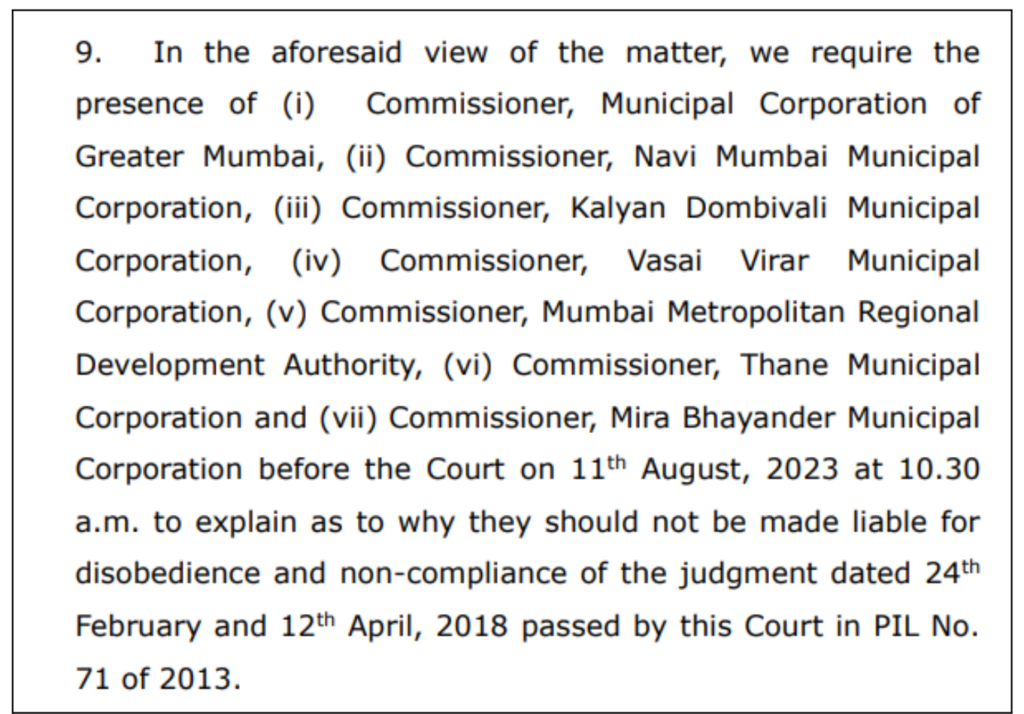In this week’s review of Court Judgments, we look at Supreme Court’s judgments that Sports quota is to encourage sports and sportsmanship in educational institutions and not to prioritize academic excellence, Section 197 of CrPC is not applicable for nationalized bank employee since they need not require a sanction from the government for removal, to threaten a person to withdraw a complaint or FIR or to settle the dispute is not punishable under Section 195A, Bombay HC’s observation that is the statutory duty of municipal bodies to ensure that potholes are filled in.
SC: Sports quota is to encourage sports and sportsmanship in educational institutions and not to prioritize academic excellence
In Dev Gupta vs. PEC University of Technology, the Supreme Court heard an appeal regarding the eligibility marks for sports quota. In this case, the appellant had questioned the imposition of a minimum 75% aggregate marks in the qualifying examination as an eligibility condition for enabling a candidate to claim admission in engineering courses under the 2% sports quota. The Punjab & Haryana High Court rejected his petition, following which he appealed to the Supreme Court.
According to the appellant, the requirement of 75% in the examinations defeated the very purpose of the quota. One cannot expect such a high standard in the academic field from a student associated with sports activities. The college contended that 28 out of 34 students who applied for the 17 reserved seats had fulfilled the eligibility criteria. Further, the allocation for admission to the seats was almost complete with only one seat remaining.
The division bench of Justices S Ravindra Bhat and Aravind Kumar observed that the objective of the sports quota was to promote and encourage sports, and sportsmanship in educational institutions, universities and in the country. It was not for accommodating academic merit. Referring to universities as the catchment for sportspersons, who can represent in state, national, international level and Olympic sports, the Bench held that the 75% marks eligibility criteria was a discriminatory practice and violation of Article 14 of the Constitution. It added that the states or universities may prescribe a certain minimum standard set of criteria for admission, but it should not be against the purpose of the quote to promote sports in educational institutions. The High Court’s order was set aside, and the appeal was allowed by the Apex Court.
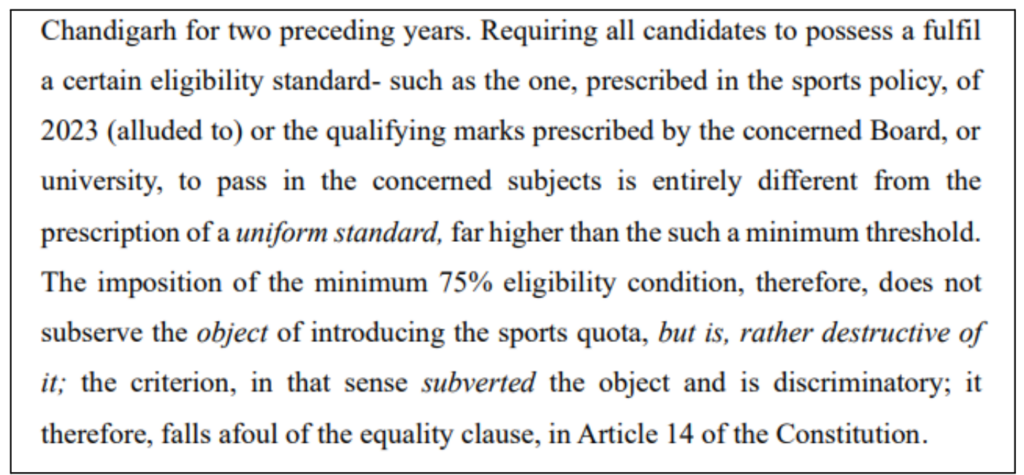
SC: Section 197 of CrPC is not applicable for nationalized bank employee since they need not require a sanction from the government for removal
The appellant in the case, A. Sreenivasa Reddy vs. Rakesh Sharma, is an Assistant General Manager, State Bank of India, Overseas Bank (Bank), Hyderabad. He is alleged to have conspired with another co-accused of cheating the Bank by sanctioning a corporate loan of Rs. 22.50 crore in favour of Sven Genetech Limited, Secunderabad. The Central Bureau of Investigation (CBI) registered an FIR under the offences arising out of the IPC and Prevention of Corruption Act, 1988 (PC Act). The Telangana High Court dismissed his petition for quashing the FIR.
He then appealed to the Apex Court. One of the issues considered by the bench comprising Justice B R Gavai and Justice J B Pardiwala was whether the appellant is removable from his office save by or with the sanction of the Government to make Section 197 of the CrPC applicable. The Bench observed that the provisions of Section 197 of the CrPC would not be attracted at all as Section 197 is attracted only in cases where the public servant is such who is not removable from his service save by or with the sanction of the Government. Thus, the provisions were not applicable in his case even though he was deemed as a ‘public servant’ for the purpose of provisions under the PC Act. However, the same was not applicable for IPC.
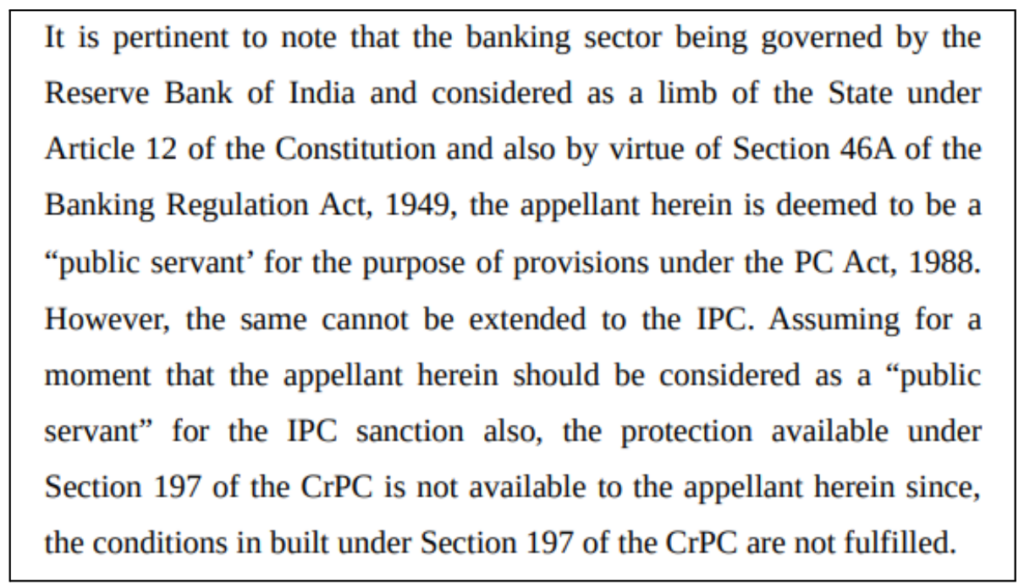
SC: To threaten a person to withdraw a complaint or FIR or to settle the dispute is not punishable under Section 195A
In Salib @ Shalu @ Salim vs. State of UP, an FIR was filed against the accused persons for threatening and pressurizing the first informant to withdraw her first FIR registered for the offences punishable under Sections 376D, 323, 120B, 354A and 452 of the IPC as well as sections of POCSO Act. Sections 147, 148, 149, 195A, 385 and 504 of the IPC were also added by the Investigating agency based on the statements referred. The High Court of Allahabad dismissed the accused’s petition seeking quashing of FIR.
When hearing the appeal, the Supreme Court Bench of Justices B R Gavai, and J B Pardiwala observed that if any individual is threatened with any injury to his person, reputation or property and such threats are administered with intent to cause that person to give false evidence, the same would constitute an offence under Section 195A of the IPC. However, in this case, the Court noted that there was nothing to show that the accused persons threatened the first informant with the intent to force them to give false evidence before the Court.
Elaborating on Section 195A, the Court noted that if a person is convicted and sentenced based on false evidence, then the person who administered the threats would be liable for the same punishment and sentence that the innocent person was punished and sentenced to. It noted that, even if the allegations in the FIR were true, then none of it constituted an offence punishable as per Section 195A. That is, to threaten a person to withdraw a complaint or FIR or to settle the dispute was not punishable under Section 195A. Further, the court also observed that there was no evidence of extortion as well in the case. The Bench quashed the criminal proceedings against the accused observing that the entire case put up by the first informant on the face of it appeared to be concocted and fabricated.
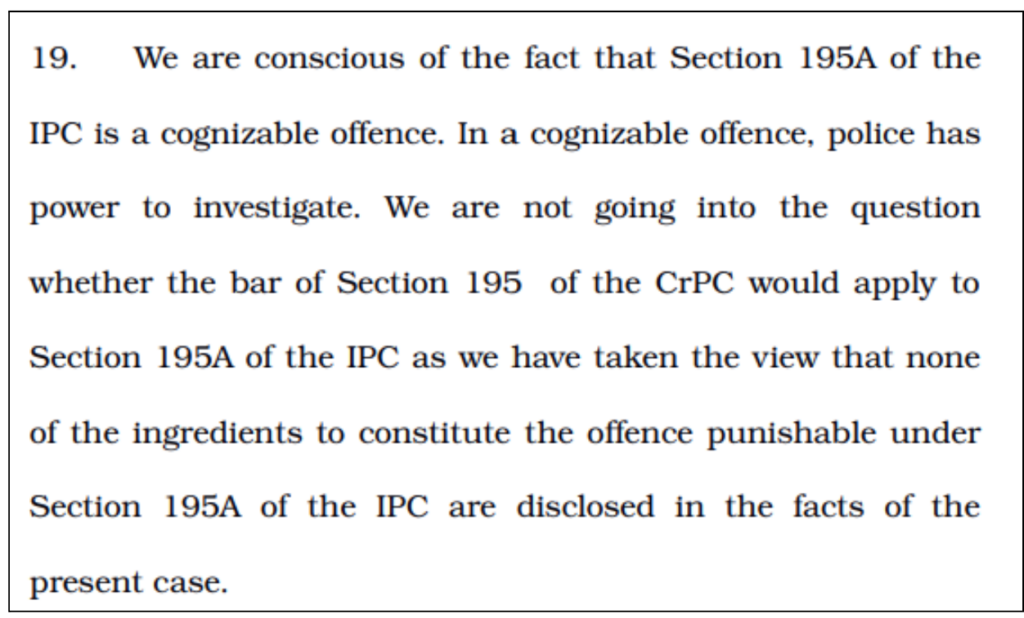
SC: Insurance companies should deal in a fair and bonafide manner and not care only about its profits
In the case Isnar Aqua Farms vs. United India Insurance Co. Ltd, the complainant was engaged in prawn cultivation across 100 acres and had insurance coverage for his prawns. A bacterial disease called ‘White Spot Disease’ spread along the east coast of Andhra Pradesh which resulted in large mortality of his prawns. The complainant filed a claim with his insurance company, but the claim was rejected on grounds that there was a breach by the complainant of the policy conditions as records were not maintained properly and accurately.
The National Consumer Disputes Redressal Commission (NCDRC) assessed the complainant’s loss at ₹ 30.69 lakhs and ruled in his favour. Dissatisfied with the NCDRC’s decision, the complainant appealed to the Supreme Court.
The Supreme Court Bench of Justices AS Bopanna and Sanjay Kumar directed that a sum of Rs 45.18 lakh must be paid by the insurance company to the firm, with 10% interest from the date of the complaint till the date of realisation, within six weeks. It also noted that the insurance company had baldly brushed aside the Death Certificate from 1995 furnished by the officials of the State Fisheries Department at Visakhapatnam because the contents were not favourable to them. Noting this, the Bench added that an insurance company is expected to deal with the insured in a bonafide and fair manner and should not just care for and cater to its own profits. It also added that it was the duty of the insurance company to disclose all material facts within their knowledge since the obligation of good faith applies to both the parties equally.
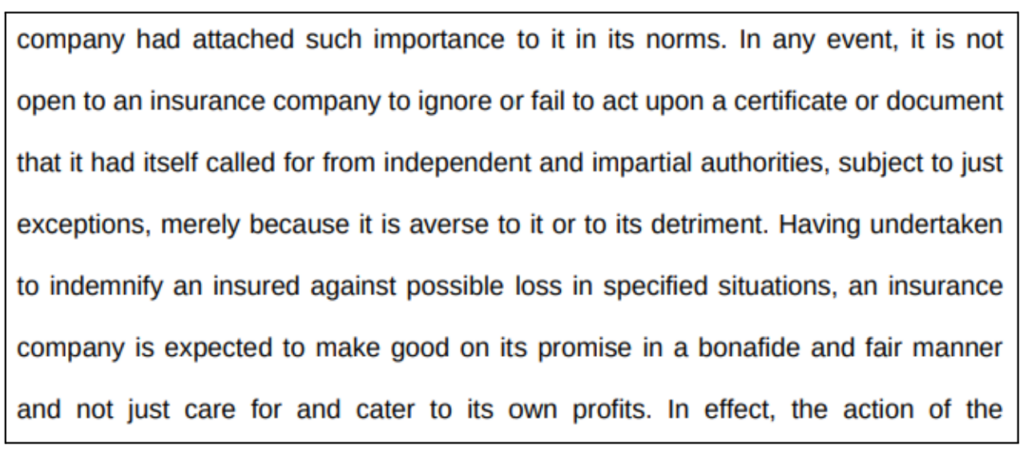
Bombay HC: It is the statutory duty of municipal bodies to ensure that potholes are filled in
In Ruju R. Thakker vs. State of Maharashtra, the court heard a contempt petition regarding the poor condition of roads in the state despite the Court’s order in 2018 issuing directions to Municipal Corporations and other authorities and the State Government to maintain the streets and roads, including footways/footpaths in good and proper condition. The order also held that it was the responsibility of the Corporations to keep the streets and footways properly levelled and surfaced and further that Corporations should ensure that potholes and ditches are properly filled in. In an order from 2022, it held that any untoward incident due to the poor roads, the respective Municipal Commissioner(s), Metropolitan Commissioner, Chief Engineer shall be held personally responsible. The Court noted that adequate measures were not taken by the Corporations. The bench of Chief Justice Devendra Kumar Upadhyay and Justice Arif Doctor summoned six Municipal Commissioners of the Mumbai Metropolitan Region to explain the non-compliance to the orders and the poor condition of roads and open manholes.
